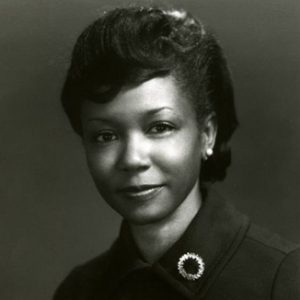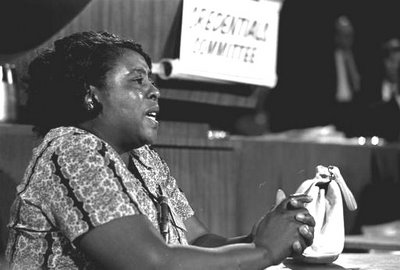Dr. Martin Luther King, Jr.
Dr. Jefferson was committed to defending human life from, as she described it, “conception to natural death.”
She first became active in 1970 when, as she recalled to the New York Times, “the American Medical Association first considered bending its founding principles in such a way that a doctor would not be considered unethical” if he or she committed an abortion.
She once described why she became a physician, “I became a physician in order to help save lives. I am at once a physician, a citizen, and a woman, and I am not willing to stand aside and allow the concept of expendable human lives to turn this great land of ours into just another exclusive reservation where only the perfect, the privileged, and the planned have the right to live.”
Dr. Jefferson also warned that abortion would target the Black community, and in 1977, she stated, “Blacks suffer more from abortion because what looks like help is actually striking against them. Blacks are fewer. They will disappear sooner….” She insisted that “[a]bortion is class war against the poor,” and told the Pittsburgh Press in 1977, “Abortionists argue, ‘Let the poor have abortions like the rich can.’ Then abortionists should make a list of the other things rich women have that they’re going to give to poor women.”
By Carole Novielli
Live Action News
In the early 1960s and 70s, organizations seeking to liberalize abortion laws, like the National Organization for Women (NOW), attempted to convince the nation that women wanted legalized abortion on demand. Many women actually opposed liberalized abortion laws, and those women’s voices were silenced by NOW (who was influenced by men seeking to profit from abortion) and NOW’s friends in the (at that time, majority male-led) media.
During that time, many pro-life women spoke out against the liberalization of abortion laws, including many women in the Black community, who saw abortion as “Black genocide.” Four of them are listed below:
Fannie Lou Hamer
Hamer was a civil rights activist who helped to found the Mississippi Freedom Democratic Party. In 1964, she ran for Congress. Hamer was also a victim of eugenic sterilization, a program which Planned Parenthood’s founder (as well as those on her board) advocated.
Ethyl Payne said Hamer called abortion “black genocide,” writing in The Afro-American, “She was a delegate to the White House Conference on Food and Nutrition…. There she spoke out strongly of abortion as a means of genocide of blacks….”
Journalist Samuel Yette also noted Mrs. Hamer’s views in The Afro American – Apr 2, 1977, quoting her as saying, “It is still a society in which an injured man must show his ability to pay before getting hospital services, but his daughter or wife can be aborted or fed birth control pills, at public expense….” Yette then recounted how Hamer blasted conference organizers: “She responded with shock and outrage at the deception. ‘I didn’t come to talk about birth control,’ she protested. ‘I came here to get some food to feed poor, hungry people. Where are they carrying on that kind of talk?'”
A 1969 article published by the Free-Lance Star quotes Hamer as denouncing voluntary abortion as “legalized murder,” saying she “made it clear that she ‘regards it part of a comprehensive white man’s plot to exterminate the black population of the United States.'”
Author Kay Mills quoted Hamer in her book as saying, “Once Black women were bought as slaves because they were good breeders. Now they talk about birth control and abortion for blacks. If they’d been talking that way when my mother was bearing children, I wouldn’t be here now.”
During that time, many pro-life women spoke out against the liberalization of abortion laws, including many women in the Black community, who saw abortion as “Black genocide.” Four of them are listed below:
Fannie Lou Hamer
Hamer was a civil rights activist who helped to found the Mississippi Freedom Democratic Party. In 1964, she ran for Congress. Hamer was also a victim of eugenic sterilization, a program which Planned Parenthood’s founder (as well as those on her board) advocated.
Fannie Lou Hamer
Ethyl Payne said Hamer called abortion “black genocide,” writing in The Afro-American, “She was a delegate to the White House Conference on Food and Nutrition…. There she spoke out strongly of abortion as a means of genocide of blacks….”
Journalist Samuel Yette also noted Mrs. Hamer’s views in The Afro American – Apr 2, 1977, quoting her as saying, “It is still a society in which an injured man must show his ability to pay before getting hospital services, but his daughter or wife can be aborted or fed birth control pills, at public expense….” Yette then recounted how Hamer blasted conference organizers: “She responded with shock and outrage at the deception. ‘I didn’t come to talk about birth control,’ she protested. ‘I came here to get some food to feed poor, hungry people. Where are they carrying on that kind of talk?'”
A 1969 article published by the Free-Lance Star quotes Hamer as denouncing voluntary abortion as “legalized murder,” saying she “made it clear that she ‘regards it part of a comprehensive white man’s plot to exterminate the black population of the United States.'”
Author Kay Mills quoted Hamer in her book as saying, “Once Black women were bought as slaves because they were good breeders. Now they talk about birth control and abortion for blacks. If they’d been talking that way when my mother was bearing children, I wouldn’t be here now.”
Dr. Mildred Jefferson
 |
| Dr. Mildred Jefferson (Image: Schlesinger Library) |
Dr. Jefferson was committed to defending human life from, as she described it, “conception to natural death.”
She first became active in 1970 when, as she recalled to the New York Times, “the American Medical Association first considered bending its founding principles in such a way that a doctor would not be considered unethical” if he or she committed an abortion.
She once described why she became a physician, “I became a physician in order to help save lives. I am at once a physician, a citizen, and a woman, and I am not willing to stand aside and allow the concept of expendable human lives to turn this great land of ours into just another exclusive reservation where only the perfect, the privileged, and the planned have the right to live.”


No comments:
Post a Comment